Tollywood Dispute Intensifies — The Calcutta High Court has directed the West Bengal government to convene a meeting on July 16 at Rabindra Sadan, ensuring the participation of all parties involved in the ongoing conflict within the Bengali film industry. The court’s directive comes after a string of legal complaints filed by filmmakers who allege professional obstruction and harassment by a key industry federation.

Court’s Stand on Artistic Freedom and Livelihood
Justice Amrita Sinha emphasized the fundamental rights of professionals in the creative sector to carry on their work without intimidation or obstruction. The court underscored the need for an inclusive hearing and ordered the Information and Cultural Affairs Secretary to report the outcomes of the July 16 meeting by July 23.
The High Court reiterated that creative professionals, including directors and technicians, cannot be prevented from pursuing their craft under the garb of internal industry disputes. The state has been empowered to ensure order, even with police support if required.
Reference: Article 19(1)(g), Constitution of India – Freedom of Profession
Tollywood Dispute Intensifies: Background of the Dispute
The conflict involves several independent directors and the Federation of Cine Technicians and Workers of Eastern India (FCTWEI). According to the complainants, including renowned filmmakers and producers, the federation has repeatedly disrupted film shoots, particularly targeting those not aligned with its guidelines.
Key events include:
- April 3: The court directed the state to mediate between both parties.
- July 2: A division bench upheld this direction, noting that the state had previously intervened in a similar dispute in July 2024.
- Multiple incidents of alleged harassment were reported, such as the disruption of a music video shoot featuring actor Anirban Bhattacharya.
Government’s Previous Role
The state had earlier initiated a review committee in July 2024 to mediate similar disputes in the industry. However, the committee was never formalized or implemented effectively. Petitioners argue that this precedent demonstrates the state’s capacity—and responsibility—to engage in industry regulation when professional rights are under threat.
The High Court has now made it clear that since the government took part in earlier mediation, it must also now ensure due process and resolution.
Stakeholder Responsibilities
At the July 16 meeting, the following stakeholders are expected to be present:
- Independent filmmakers and producers
- Members of FCTWEI
- State’s Information and Cultural Affairs Department
- Legal representatives from both parties
The court has requested a written submission from the state outlining the meeting’s outcome, any resolutions made, and proposed safeguards for the future.
Reference: West Bengal Information & Cultural Affairs Department
Core Issues Raised by Directors
The petitioners allege that:
- They were denied access to technicians for their film shoots.
- The federation imposed “approval conditions” that were neither legal nor ethical.
- Several projects were halted mid-way, leading to financial losses.
- Certain filmmakers faced online harassment and threats.
The court had earlier noted that these actions demonstrated a “vindictive approach” and were in violation of individual rights.
Legal and Economic Implications
The case highlights deep-rooted concerns in the industry:
- Legal: Abuse of collective bargaining power and trade monopolies.
- Economic: Multiple delayed or canceled projects impact not just the filmmakers, but thousands of daily wage earners and allied businesses.
- Social: The case also reveals the fragile support structure for artists operating outside established networks.
Legal experts suggest that if such disputes persist, mandatory arbitration mechanisms may need to be introduced via state guidelines or an industry charter.
The Way Ahead
The July 16 meeting is expected to propose:
- A formal dispute resolution mechanism within Tollywood.
- Clarity on what constitutes lawful trade restrictions vs. coercion.
- A joint declaration or agreement to prevent recurrence of similar conflicts.
- A government-monitored grievance redressal system.
Final Thoughts
The Tollywood dispute—and the High Court’s decisive intervention—has brought to light the urgent need for reform in the governance of creative industries. Ensuring that no single group can exercise undue control over professional opportunities is key to sustaining the health, diversity, and freedom of India’s regional cinema.
As the case continues to unfold, all eyes will be on the July 16 dialogue, which may set a precedent not just for Bengal’s film industry, but for how artistic ecosystems across the country resolve internal conflict—legally and ethically.
Also read: Home | Channel 6 Network – Latest News, Breaking Updates: Politics, Business, Tech & More

